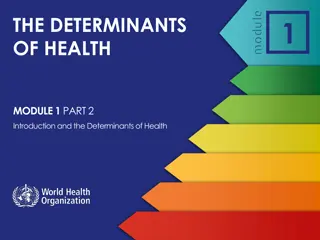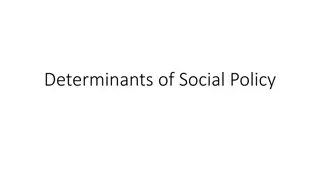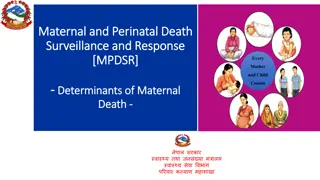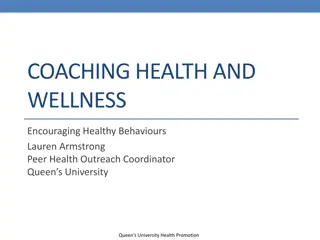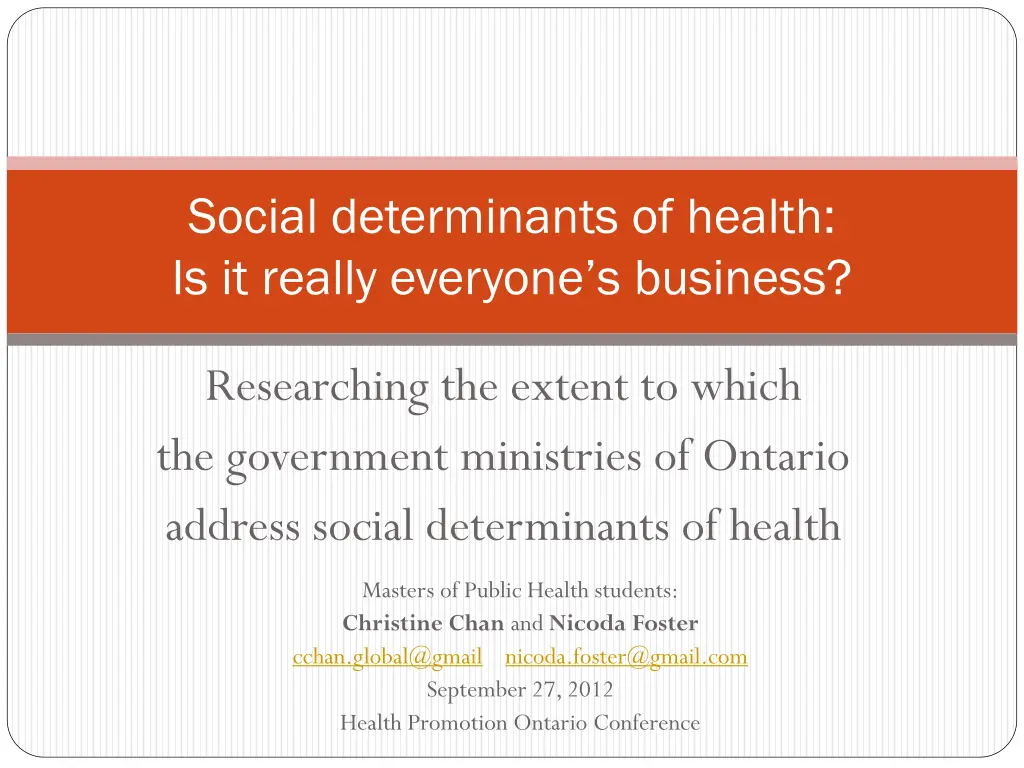
Government Ministries of Ontario and Social Determinants of Health
Investigating the extent to which Ontario's government ministries recognize and address social determinants of health, Masters of Public Health students Christine Chan and Nicoda Foster conducted research focusing on key factors influencing ministry adoption of a determinants approach. By assessing ministries' impact on health and social determinants, they aim to highlight the potential for societal-level improvements in health and well-being. The research methodology involved unstructured interviews with ministries, revealing which responded positively and those that did not engage with the inquiry.
Download Presentation

Please find below an Image/Link to download the presentation.
The content on the website is provided AS IS for your information and personal use only. It may not be sold, licensed, or shared on other websites without obtaining consent from the author. If you encounter any issues during the download, it is possible that the publisher has removed the file from their server.
You are allowed to download the files provided on this website for personal or commercial use, subject to the condition that they are used lawfully. All files are the property of their respective owners.
The content on the website is provided AS IS for your information and personal use only. It may not be sold, licensed, or shared on other websites without obtaining consent from the author.
E N D
Presentation Transcript
Social determinants of health: Is it really everyone s business? Researching the extent to which the government ministries of Ontario address social determinants of health Masters of Public Health students: Christine Chan and Nicoda Foster cchan.global@gmail nicoda.foster@gmail.com September 27, 2012 Health Promotion Ontario Conference
Presentation outline 1. Research focus 2. Research methodology 3. Key factors determining whether Ministries recognized and adopted a determinants approach 4. Reflections 5. Q & A
Research focus To what extent do the government ministries of Ontario recognize and address the social determinants of health?
Research focus A determinants approach by all government ministries of Ontario would create society-level improvements towards an environment that supports good health and wellbeing.
Research methodology June August 2012: data collection September 2012: data analysis Largely unstructured interviews Two core questions asked of every Ministries: (i) How does the work of your Ministry impact health? (ii) To what extent does the work of your Ministry impact on the social determinants of health?
Ministries which responded (R), Ministries which did not respond (NR) Ministry for Aboriginal Affairs (NR) Ministry of Agriculture, Food and Rural Affairs (R) Ministry of the Attorney General (NR) Ministry of the Children and Youth Services (R) Ministry of Citizenship and Immigration (R) Ministry of Community and Social Services (NR) Ministry of Community Safety and Correctional Services (R) Ministry of Consumer Services (R) Ministry of Economic Development and Innovation (R) Ministry of Education (R) Ministry of Energy (R) Ministry of the Environment (R) Ministry of Finance (R) Ministry of Government Services (R) Ministry of Health and Long Term Care (R) Ministry of Infrastructure (NR) Ministry of Intergovernmental Affairs (R) Ministry of Labour (NR) Ministry of Municipal Affairs and Housing (NR) Ministry of Natural Resources (R) Ministry of Northern Development and Mines (R) Ministry of Tourism, Culture and Sport (R) Ministry of Transportation (R)
Data Analysis The following categories were used to analyze the data collected: Policy instrument (Schneider and Ingram, 1990) Authority Symbolic Incentives Capacity building Learning Main factor influencing whether a social determinants approach was taken Extent of collaboration for health purposes Ways of resolving potential conflicts with other Ministries
Factor Factor Description Description Political climate Political direction of the party in power, which is largely influenced by the ideological perspective which informs its doctrine. Champions The need for influential and knowledgeable individuals to lead and support the uptake of SDOH or health equity related activities. Legislation Although all Ministries must adhere to legislative requirements, legislation is the prime driver for some ministries, and for such ministries, legislation is an important lever by which to steer them towards another way of working. Mandate driven Strict adherence to the mandate set out for the Ministry without a broad interpretation or with avoidance of deviation. Policy Processes The government Ministries of Ontario usually engage in a horizontal decision making process which involves engaging all relevant Ministries in the review and critique of proposed policies and decisions that could have a broader impact following implementation. Capacity building tools The use of tools as a vehicle to orientate a Ministry towards a determinants approach. Moral imperative The conviction that the determinants of health is, from a moral perspective, the correct thing to do.
Political Climate A factor for most Ministries. Examples: - MOHLTC -Ministry of Community Safety and Correctional Services -Ministry of the Environment
Champions Within Ministries. Examples: - Ministry of Health Promotion and Sport - Ministry of Tourism, Culture and Sport - Ministry of Children and Youth Services
Legislation Prime driver for some ministries. Examples: - Ministry of Community Safety and Correctional Services - Ministry of Energy
Mandate-driven If it s not in some Ministries mandate, the likelihood of them doing it is low. Examples: - Ministry of Economic Development and Innovation - Ministry of Community Safety and Correctional Services
Policy processes Horizontal policy development processes Examples: - MOHLTC - Ministry of the Environment - Ministry of Children and Youth Services - Ministry of Agriculture, Food and Rural Affairs - Ministry of Finance - Ministry of Northern Development and Mines
Capacity building tools Only mentioned by: Ministry of the Environment Ministry of Children and Youth Services MOHLTC HEIA. CART.
Moral imperative Paying attention to the social determinants of health is the right thing to do. Examples: Ministry of Children and Youth Services Ministry of the Environment
Reflections Capacity building tools Capacity tools that provide information or training assume that barriers to desired behavior consist of lack of resources rather than incentives. Schneider and Ingram (1990: p. 517)
Reflections Horizontal policy processes Key Sets foundation for a concerted coordinated effort that a determinants approach requires Intersectoral meetings alone are not enough
Reflections Health is: Still largely perceived as healthcare and Largely the responsibility of health agencies
Reflections Parallels with Environment Environment has done a great job linking itself to collective wellbeing and sustainability Health can learn from this and build on this Partner with them
Need for renewed understanding by non-health agencies All Ministries contribute to the social determinants of health. This simple recognition would take a long way towards building a sense of collective responsibility towards health.
Conclusion Despite indirect impacts not everyone considers health their business. Preliminary findings only. More to be done






